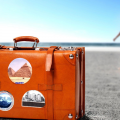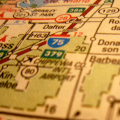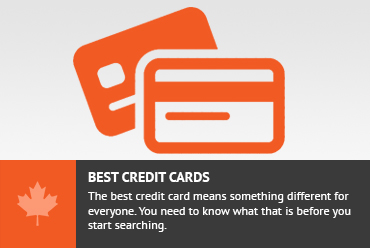Want to travel like a pro? Then learn from the pros, who share the smartest travel moves they ever made; from frequent flyer mile hacks, to destination choices, to going off the beaten path or even staying on it, let’s see what travel moves influenced the way these experts travel and see the world forever.
Dear Nora,
I’m curious: what would you say is your #1 smartest travel move? – Brian
While I’d like to claim ownership of a variety of brilliant travel moves (ha!), the one that stands out – dramatically – for me is the rabbit hole of free accommodation I discovered fairly early into my full-time travel career.
It started with a gig that allowed me to volunteer in trade for free accommodation; which morphed into something I did in half a dozen other countries and scenarios.
From there my logistical requirement for more free time to tend to my travel blog led me to house-sitting, where I could enjoy the comforts of (other people’s) homes, have time for work, and live like a local in a dozen or so more countries (and often some pretty plush digs, I might add). See also: 19 Cautionary Tales About House-Sitting.
I also lived on five boats spanning three Caribbean countries (all for free), and of course I enjoyed a variety of hospitality exchange (couch surfing) experiences.
So quite by accident, I became something of an expert on how to get free accommodation around the world; and from there I also learned how to get cheap accommodation, how to find places to rent for a fraction of what you’d pay with AirBnB, and more. For more on all these accommodation options, check out: The Creative Guide to Free or Cheap Accommodation.
All in all, my free accommodation adventures saved me well over $100,000 in my 12 years of full-time travel (so far). And it provided me with invaluable local contacts, activities, and ways to experience the world that I’d never have had if I stayed in hotels.
But that’s just me, and getting free accommodation is FAR from the only way to travel smart. Here are 29 other tips to help you become a savvy and smart traveller:
PACKING TIPS
The composition (and weight!) of your luggage has much more impact on your trip than you might think. Here are some tips:
Go Ultralight
Michael Alexis doesn’t mess around.
“I own two shirts, one pair of pants, one shorts, one socks, etc. These are all quality, durable items made of natural materials like wool. They travel well, and fit well.”
While he spends extra for high quality items, he believes their durability and long life helps him save money over time. And over the years, in addition to the flexibility and freedom of being able to pick up and go easily, Michael figures he has saved thousands of dollars being flexible with when he flies and where he stays (and of course never having to pay for checked baggage). See also: How to Travel Ultralight With Carry-On Luggage Only.
Pack What You Wear in Daily Life
Amanda Page also waxes poetic about travelling with carry-on luggage, but what’s interesting here is how she learned this tip. On her first international trip she did everything she thought she needed to do to be a ‘traveller’.
“I had a backpack full of clothes I’d never really worn before, and brand new hiking boots, which I tied to my pack [with no intention of mountaineering]. I filled my pack with new clothes I thought an international traveller would wear. All I really needed was a pair of jeans and a few shirts to rotate through. I wish I’d had tennis shoes.”
From this experience, Amanda learned to pack what she wears in daily life, not what she thinks a traveller “should” wear. And because she travels with carry-on luggage only, she saves money not checking luggage. See also: Checked vs Carry-On Luggage.
Organize Your Gear
Jessie Zaylia is a big fan of packing cubes.
“I purchased various sizes of packing cubes, which are essentially bags within your luggage…only with breathability and zippers. You roll up or otherwise organize your travel items within these cubes, and the cubes fit neatly inside any carry-on or suitcase.”
Because of packing cubes, Jessie fits more stuff into a smaller amount of space, which allows her to travel with smaller luggage and save on checked bag fees. See also: 13 Awesome Packing Tools and Tips.
CREDIT CARD TIPS
There are lots of ways to enhance your travels with the strategic use of credit cards. Here are some creative ones! See also: Top 5 Best Credit Cards in Canada.
Use Premium Credit Cards
Kevin Nielsen of Two Teacher Trek warns against being turned off by the high annual fees of “luxury” credit cards. For him, the perks more than pay for the fee.
“One of the more popular luxury credit cards [in the U.S.] is the Chase Sapphire Reserve with a $450 annual fee. While most people would balk at that price tag, it comes with a load of benefits. First of all, there is an annual $300 travel credit (so for those who travel, the annual fee is really $150). It also gives you free Priority Pass Lounge Access all over the world. A final benefit (although there are more) is the $100 Rebate for TSA Pre-Check/Global Entry. On top of that you get 50,000 Ultimate Rewards points on sign-up that you can use to book travel or transfer to hotel and airline partners (about a $750 value).”
If you add up all these benefits, the annual fee more than pays for itself. And Kevin says the Priority Pass lounge credits have been invaluable in getting away from the crowds and enjoying some free food and drinks while travelling with his family.
While Canada doesn’t have the Chase Sapphire Reserve, here are a few credit cards that get you lounge access.
Use Miles/Rewards to Fly in Business Class
Andy Abramson of Comunicano has been applying his AMEX purchase points towards travel purchases for over 15 years, and he takes an average of four international trips per year – never lower than business class.
“Beyond flying for only the taxes on a ticket, I have flown in first class or business class between the USA and Europe, and from Hong Kong to London on some of the world’s best airlines. The points get moved between AMEX and the airlines’ frequent flier account in seconds. This makes getting a ticket easy.”
Get Your Preferred Credit Card Before Changing Jobs/Lifestyle
Just before Joe Wareham of Strawberry Tours quit his job in the UK to travel the world, he applied for a travel-friendly credit card; something he may not have qualified for after becoming a nomad.
“Thanks to this credit card, every time I pay with my card I pay 0% fees and I get an excellent exchange rate – better than taking money out of the ATM, going to a money exchange, or any option. Over the last four years of travelling, it must have saved me hundreds of dollars.”
For more tips on credit card/debit card/ATM use etc, check out the ultimate guide to Travelling With Money.
Look for Sign-Up Bonuses
Jacob Lunduski of Credit Card Insider harnessed the power of sign-up bonuses to fund his European trip.
“I signed up for two different cards and earned two free flights and checked bags. I used the rest of the flight expenses and a few hotel nights to hit the sign-up bonus [linked to a spending requirement] for the card, which allowed me to earn two free flights for a trip I took a few months later!”
All in all, Jacob saved over $500 in travel fees and added 20 points to his credit score (for responsibly paying off the credit card charges), in addition to earning enough points for two free flights for a future trip.
Don’t Go Without!
Gary Arndt of Everything Everywhere says his smartest travel move was borne of an initial mistake. Because he wasn’t a fan of debt or credit cards in general, he spent his first six (6!) years of travelling full-time without a credit card at all, instead using a debit card for everything. When he eventually broke down and got a credit card, he wished he’d done it sooner.
“When I finally decided to get a credit card I had a problem. I had been travelling so long, I had no credit history. It wasn’t bad credit, it was no credit. I was a ghost in the system. I had to get a secured credit card from my bank and with that, I was able to build up credit to eventually get a real card.”
Gary cites many benefits to travelling with credit cards, including:
- Having another way to pay if one card (eg: a debit card) is denied because it has been flagged as a possible fraudulent purchase. Says Gary: “I’ve literally been in the middle of the Australian Outback unable to pay for gas because Well Fargo locked my debit card ‘for my protection’.”
- Accruing points for rewards and travel.
- Using it to make reservations for hotels and rental cars.
“I’ve now started using my cards through Apple Pay when I travel which has made life really easy. This summer in Europe I was able to use Apple Pay in over a dozen countries and at almost every place I spent money.”
See also: 9 Mistakes to Avoid With Travel Credit Cards and Tips for Travelling With Credit Cards.
FLIGHTS
Booking flights is my least favourite travel-planning task, because I’m always nervous that after I click “buy”, I’ll find an even better deal. Here are some tips to ensure that doesn’t happen to you.
Check the Multi-City Option
Kenny Colvin of This is Giant Squid travels about 100,000 miles per year. His smart travel trick is in creatively booking his flights using the multi-city option. It all started with an overpriced flight from NYC to Sydney Australia at $1,600 for an economy ticket.
“I tried a multi-city route that would give me a day or two in a different city. (Pro tip: when choosing a stopover city think big. Think dream destinations. Even if it’s not “on the way”, sometimes those trips are even cheaper. Though it does help if it’s a major city or a hub). I tried a multi-city flight going NYC to Sydney for a week, then Sydney to Tokyo, for three days, then home to NYC. It was $1400. Yes, it was cheaper but not much cheaper. Then I typed in NYC to Tokyo, Tokyo to Sydney, Sydney to Tokyo, and Tokyo to NYC…. aaaaaand bingo. $1200 all in, $400 cheaper than RT NYC to Sydney.”
Using this strategy, Kenny also nabbed a return flight from Prague to Tokyo for $550; this included a leg from London to Tokyo that was the exact same initial flight he was looking at – which cost $350 more for that flight alone.
Add a Stopover
Similar to Kenny’s strategy, Danielle Thompson of the Freelance Travel Network saves hundreds of dollars by adding an extra stop on her flight itineraries.
“On the way from Osaka to Bali, it was cheaper to stay in Hong Kong for three nights with hotel, compared to flying direct. And on the way to Toronto from Israel, the flight with a stopover in Paris for a few nights was cheaper than any other path from Toronto to Israel.”
Danielle saves an average of $300 using stopovers by checking the airline’s flight map to see if there’s a cheeky stopover she can make.
Accumulate Frequent Flyer Miles Through Online Shopping
The strategic use of frequent flyer miles has revolutionized travel for many people (myself included). But it’s not just about churning credit cards with big sign-up bonuses (which is harder for us to do in Canada as we don’t have quite as many fruitful options). Kyle Stewart of Live and Let’s Fly and his wife accumulated millions of miles and points by not only charging all their expenses to credit cards, but also participating in various promotions.
“Stopping first at a shopping portal run by an airline will pay a commission to consumers for their normal online spend without any increase in cost. Go to CashBackMonitor and search for your favourite retailer, and you can find out just how many miles and points you can earn by stopping at a shopping portal first, before continuing on to make your purchase.”
Get Bumped
Charles McCool is all about the free flights. His smartest travel move? Be flexible, resourceful, and assertive. And one of the best ways to get the most out of a flexible travel itinerary is to volunteer to get bumped on overbooked flights.
“I’ve used a variety of air travel tactics, including introductory route, volunteering to get bumped, booking a flight with a stopover, and amassing and redeeming frequent flier points.”
All in all, using these tips, he ended up on a four-continent, free flight adventure. Actually, he made money doing it.
ROAD TRIP TIPS
While road-tripping is not inherently cheap, it can be if you know what to do. These three travel tips will help you make – and save – the most out of life on the road.
Overland All the Way
Ryan Shauers of Desk to Dirtbag made overlanding – more specifically, truck camping – his main means of travel and life, and since becoming a full-time traveller in 2013 he has put more than 50,000 miles on his truck driving through North, Central, and South America.
“Overlanding allows me to save huge in terms of lodging (camping, usually for free, in the back of my truck), cooking (since I can carry a two-burner propane stove, kitchen gear, and lots of food), and of course, on public transportation since I’m just driving myself.”
Ryan also loves getting off the tourist trail to find places foreigners seldom see, all within his own schedule – stopping where and when he wishes.
Roof Top Tent
Gianluca Boncompagni and her partner didn’t much enjoy road-tripping around New Zealand in a campervan, as it didn’t give them much space. But in Australia, they drover over 6,000km with a roof top tent, which made all the difference.
“We finally had space inside the vehicle to fit our bags, food, etc. as well as to even offer lifts to some other travellers. We slept on top of our car, in a VERY comfy tent, that took us close to 10 mins to setup or pack back down.”
Best of all were the cost savings. Instead of paying $30+/night for a hostel, they spent an average of $10/night for vehicle camping. Over three months, including the $1200 they spent on the tent, they still saved many hundreds of dollars.
After the trip, they were so jazzed by their roof top tent experience that they came home and founded Off Road Tents.
Find Free Camping
Brittany of The Rolling Pack and her partner are full-time RV travellers, who save big bucks camping for free (or very cheap) on public land.
“My partner and I felt strongly that there had to be a better option than overcrowded, pricey RV parks. Sure enough, we were right! Now we very rarely stay in RV parks. Instead, we use a combination of smartphone apps and maps to find beautiful, affordable (often free!) campsites on BLM and National Forest Service land.”
They figure they save about $600 per month using this strategy. Click here for more campervan travel tips.
ACTIVITIES
What you do while you travel can enrich or detract from your travel experience and/or your wallet. These activities enrich both.
Free Walking Tour
Bernard Sury used to pay for guided tours, but found himself frustrated at the expense and often bored. Then, he discovered free walking tours, which are available in most cities.
“Free walking tours are tours based on tips. There is no price and you can give what you want at the end of the tour, according to your satisfaction and budget. These tours are quite fun as guides do their best in order to get more tips.”
Bernard formerly paid an average of $50 for guided tours. Now he gives what he considers fair – from $5 to $50, depending on the experience and services offered. Because of the recommendations given by the local walking tour guides, Bernard also saves an additional 10-20% during the remainder of the trip in avoiding tourist traps.
Inspired by his walking tour experiences abroad, Bernard became a walking tour guide himself, before founding GuruWalk, an online platform of tours based on tips available in more than 60 countries.
Hire Local Guides
Laurie Richards doesn’t look for free walking tours, but she does hire local guides rather than trying to figure everything out herself.
“Whether in Morocco, Japan, Italy, or Alaska, find a local who knows the ins and outs. Most recently, I had an opportunity to travel to Alaska. Not knowing what my best options were for a day of fishing, I found someone who did. Not only did the guide take me to a great fishing location, he patiently taught me what I needed to do, showed me how to do it and ensured I had the entire experience. He also made arrangements for another type of fishing in another spot. And, perhaps most impressively, he recommended and made arrangements for us to take a seaplane up to Mount McKinley.”
For Laurie, hiring local guides has always been worth every penny, especially compared with the challenges of trying to figure out everything herself, requiring hours of research, lack of pertinent local information (like road conditions), language barriers, and more.
Leverage Your Network (Facebook)
You never know who you know, and who they know. Stefanie Oconnell knows this.
“Whenever I’m planning a trip, I put a general post on Facebook asking for recommendations – places to stay, things to see, places to eat, etc. I have personal connections all over the country and the world, but by posting a general facebook status, there’s an opportunity for people to come out with what they have to offer, rather than me having to uncomfortably ask. I’ve gotten everything from free places to stay to free Cirque du Soleil tickets using this tactic.”
In addition to freebies, Stefanie also discovered that posting on social networks connected her with friends of friends who ended up being very helpful for further insights (and freebies).
FUNDING TRAVEL (EARNING MONEY)
Every day it seems there are increasingly more ways to earn a living while you travel. Some are location independent, others not. Get creative! Here are a couple of ways some pro travellers did it. See also: 11 Ways to Earn Money While You Travel.
Rent Out Your Home
Larry Waight says travel is not nearly as expensive as many people think. He rented out his house on AirBnB and used the funds to travel and live in another country for a year.
“I not only saved over $50k but I enjoyed life in another country. It taught me how to appreciate the small things at home and that just moving from one place to the next makes you appreciate life more.”
AirBnB isn’t the only way to rent out your home. Some of my career travelling friends and colleagues sublet their homes to university professors. Others hire property management companies. And others yet broker rental deals privately through websites like Craigslist.
Work for Resorts/Cruise Ships
Lisa Ellen Niver of We Said Go Travel loved scuba diving, but she couldn’t afford to dive on her salary at the time. So on a friend’s suggestion, she applied to work at Club Med as a G.O. (an activity organizer).
“I had never heard of it before but sent in a resume and paid to fly to Florida for a group interview. They offered me the job but in Colorado. I wanted to go scuba diving but they needed a person in the kids club who could ski. She promised that if I went to the snow, next I would get underwater. I decided to go for it. I ended up at Club Med for a year and on ships for nearly seven! It was the most amazing way to travel, see the world and save money. I absolutely loved it.”
This smart travel move launched Lisa’s ongoing career as an award-winning travel expert who is featured around the world. To this day, she’s glad she took a chance and went to Club Med to ski when she wanted to go scuba diving. “You never know what can happen if you just begin.”
MISCELLANEOUS BITS O’ GOLD
The smartest travel moves below defy categorization, yet deserve the utmost attention.
Visit Places With Recent Upheaval
Anthony Bianco of The Travel Tart has an unconventional approach to travel that has proved to be very smart, indeed. He chooses destinations where recent riots have scared all the tourists away. Even once the trouble/danger has cleared, it takes ages for tourists to return. This is when Anthony goes.
“Once it’s safe, travellers can turn up with a much better exchange rate and everything from accommodation to food is much cheaper. One example of this was when I travelled to Argentina one year after they had defaulted on a debt repayment, sending the country into economic chaos. They had pegged their peso 1:1 with the U.S. dollar beforehand, but after the crisis, the peso was floated and had devalued about 3-4 times when I arrived, which meant I saved bucketloads!”
It’s also worth noting that destinations that have been affected negatively like this often enthusiastically welcome the tourists who do come. In addition to better exchange rates, you’re likely to get cheaper rates overall and better service.
Go For the Digital Detox
While most travellers would agree that smartphones and other forms of technology have made travel much easier (and cheaper), our constantly connected world means we don’t always get the break we’re looking for when we travel.
Though Manjul Rathee hadn’t planned a digital detox, when she found herself in a remote off-grid village in India for a week she was forced to abandon her devices.
“I spent my time immersing in local culture and picked up Tabla lessons from a local musician. I spent time with the local community, artists and craftsmen. By the time I returned to London, I felt so different compared to my usual city breaks or beach holidays where I still tend to catch up on work emails. I felt recharged both physically and mentally.”
Manjul was so recharged after her break, that shortly thereafter she became the innovation lead for an award winning charity in London, co-founded an eye health charity, and founded Soulscape: a travel company that recreates transformative expeditions.
She’s not the only one. Johnny Welsh and his girlfriend unplugged all their devices during a 16-day road trip, jokingly nicknaming the trip “Paper Maps, No Apps”. He talks about how much more effectively they connected with everything, everyone, and especially each other.
While it was a life-changing trip for Johnny that has morphed into a new book, he also admits that it wasn’t particularly a money-saver.
“At the end of a ten hour drive I found it difficult to drive in, drive out, drive in, drive out of hotel parking lots to ask pricing. After a while we just settled for whatever because we needed to get out of the car.”
But not all smart travel moves are about the money. In the case of a digital detox, both Manjul and Johnny would agree that the benefits of unplugging outweighed the cost.
Hotel Loyalty Pays
Christine Maxwell of Her Money Moves recommends staying loyal to your favourite hotel chain, even abroad. Because she has platinum status with Marriott, she discovered in Europe that she and her family were consistently upgraded to suites and given other perks because there are less customers with status in Europe than in North America.
“I always book directly with a hotel (in my case Marriott) to see what discounts they offer. We were surprised to see that they offer U.S. military discounts, even in Europe. We saved over 50% of the publicly advertised rate everywhere we stayed.”
Anitra Durand-Allen of The Mom on the Move swears by hotel loyalty because of the points. “I’ve saved $1,000 each year in travel from discounts, loyalty pricing, and free hotel stays.”
Take a Sabbatical
Kyle Stewart (mentioned earlier for his frequent flyer mile hack) discovered that taking a six month sabbatical to Thailand wasn’t as counterintuitive as it first seemed.
“When we returned to the U.S. we were more focused than ever before and had a clarity found only when you break the norm. Many people had cautioned us with stories of how such a lapse in work history could be damaging later, but I found that employers have not penalized me for my sabbatical and instead wanted to hear more about what I learned and how it changed me. If anything, taking a sabbatical enhanced my career.”
Travel by Train
Paula Simpson of Saucy and Spice is a woman after my own heart with her love of train travel. She travelled through India, Vietnam, and Sri Lanka, finding the local trains to be a trip-changing experience.
“Not only did I save a lot of money (Colombo to Kandy in Sri Lanka cost me about $2), but the views are spectacular and show a side of life that isn’t easily seen in traditional tourist traps. Train travel harks back to a more traditional, romantic way of travel; I often feel like I’m some character in a novel. It’s truly about the journey and not the destination. A book, some snacks, and often a day of rest in between busy days exploring. The best thing about train travel though, is the people. I sit next to all sorts of people; I’ve had children thrust in my lap, shared food with any number of people with whom I share no common language, and had conversations with locals that I would not have had otherwise. It’s made me more open to other cultures, it’s made me try weird foods I wouldn’t have otherwise, and I’ve made connections with real people in a meaningful way.”
Travel With Somebody
Joe Saw of JK Go met his wife in the UK while she was travelling and studying abroad, and now they travel full-time together. As much as solo travel can be empowering and freeing, you can’t deny the cost savings of travelling with a partner or friend.
“We’re able to save money by splitting costs such as accommodation, cab fares, airport transfers, supplies, or bulk buying food or drink at stores. We also encourage each other to try new things, make better memories together, and overall have a safer, more enjoyable travel experience together.”
But not all of us have a partner or friend willing or able to hit the road with us. There are pros and cons to every scenario. See also: Solo Travel – The Good, Bad, and Ugly; and Couple’s Travel – Good, Bad, and Ugly.
Get Travel Insurance, and Pay Extra for Flexible Flights
Matthew Hulland of The Travel Blogs was on a tight budget when he went to southeast Asia, but he still shelled out for travel insurance and flexible flights. While he was abroad, he got a call from his mother.
“She told me she had been diagnosed with aggressive breast cancer. With this news I started looking at flights home. Within a couple of days I was back with my family. I had onward flights booked from Borneo to Australia, NZ and Fiji and due to the fact I had a flexible ticket I was able to postpone all of them up to one-year.”
And because of his travel insurance, he was reimbursed for the cost of the return flights from Borneo due to family emergency.
Personally, I’m not big on paying extra for flexible flights, but Matthew makes a good case for it. Travel insurance, however? A must-have. See also: The Ultimate Travel Insurance Guide for Canadians.
Fly With Young Kids Instead of Driving
While most people cringe at the thought of flying with three young children aged 5, 3, and 1, Jeff Neal says it was the smartest travel move he ever made, hands down.
“I know this sounds insane, but a two hour plane ride is a lot easier than a nine hour car ride. Planes allow parents to bring baby strollers for free, and one car seat per child, for free! And, lap children are free, and they allow you to bring one diaper bag per child, for free.”
Considering these free exceptions, the decision was easy for Jeff, who also noted the great value of much less time being cooped up in a vehicle with kids. See also: Family Travel – The Good, Bad, and Ugly.
Sign up for Cash Back Websites
James Cave of Portugalist has saved thousands of dollars on travel-related purchases by using websites like TopCashBack.
“Many travel companies, from hotels to tour companies, pay a commission to websites that send them customers. The commission varies: for flights it might be less than 1%, for hotels it could be 10% or more, and for travel insurance it could be even higher. Cashback websites like Topcashback give you back that commission when you use their site. While it mightn’t be very lucrative if you’re just buying a flight, it can add up if you spend a lot on hotels and accommodation. Booking.com, for example, usually pays 6% commission, which means that you get $6 back for every $100 you spend with them.”
Best of all, using the site takes no time at all. It’s just a few seconds and a couple of extra clicks to get to the same travel websites he planned to book with all along – and those clicks earn him money back for everything he books and buys.
Adrienne of Bucket Half Full uses a similar strategy using the website Ebates.
“Download the browser plug-in to get cash back on all of your travel expenses. Right now they have 4% cash back on all completed Expedia hotel stays. Once your account has reached a balance of over $5 they will send you a cheque in the mail.”
And don’t limit your cash back purchases to travel expenses; these websites offer cash back on a huge number of online retailers, which in turn, can help pad your travel fund.
What’s the smartest travel move YOU ever made? Please share in the comments!
Feature Photo by Persnickety Prints on Unsplash
Dear Nora, smart travel moves, smartest travel moves










nice one keep it up